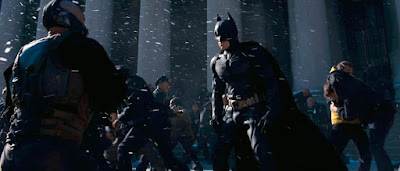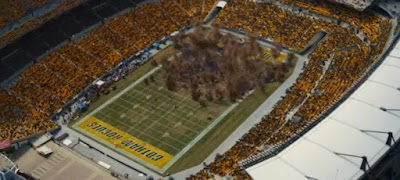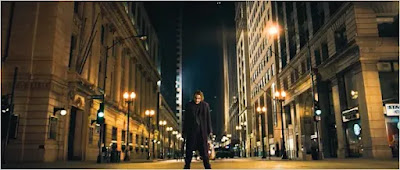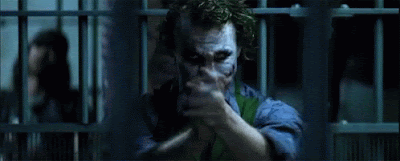"No One Plays 100%"
Rugby for the sake of rugby does not a movie make. John Huston's Victory, a soccer film about soccer, is a listless affair even with a cast that features Michael Caine, Sylvester Stallone and Pelé. But Clint Eastwood's Invictus,* about Nelson Mandela's uniting of an apartheid-torn South Africa though a burst of sports-fever, manages to tell a deeper story through the guise of a sports-film. It's a ruse that's perpetuated throughout the film as incident after incident of potential assassination or terrorism is exposed as something else; the fragile coalitions uniting the divided country are constantly in danger of exploding into violence, and the reminders are all around.
Reminders is exactly what Mandela is fighting against. His personal mandate is to keep the past in the past and move towards a united future. A former terrorist and prisoner, as president of a deposed Dutch government, he re-casts himself fresh to serve his country's interests, and finds the most difficult part of the job convincing others to do the same. By uniting former enemies under a common interest, the hope is the citizenry can at least start to look at each other without suspicion.
Rugby for the sake of rugby does not a movie make. John Huston's Victory, a soccer film about soccer, is a listless affair even with a cast that features Michael Caine, Sylvester Stallone and Pelé. But Clint Eastwood's Invictus,* about Nelson Mandela's uniting of an apartheid-torn South Africa though a burst of sports-fever, manages to tell a deeper story through the guise of a sports-film. It's a ruse that's perpetuated throughout the film as incident after incident of potential assassination or terrorism is exposed as something else; the fragile coalitions uniting the divided country are constantly in danger of exploding into violence, and the reminders are all around.
Reminders is exactly what Mandela is fighting against. His personal mandate is to keep the past in the past and move towards a united future. A former terrorist and prisoner, as president of a deposed Dutch government, he re-casts himself fresh to serve his country's interests, and finds the most difficult part of the job convincing others to do the same. By uniting former enemies under a common interest, the hope is the citizenry can at least start to look at each other without suspicion.
Eastwood lays out the territory in his first elegant shot, panning from a neatly manicured grass-field filled with well-appointed white rugby players, up over a rigid fence to a city street and beyond it, to a ram-shackle wire fence holding back a vacant lot of towns-folk playing rugby as best they can. They have the one thing in common, but that's it. And that's the start.A major criticism of the Eastwood style is a tendency to over-state the case, and that is in abundance in this film: through ham-fisted characters like a full-of-himself sports-announcer who provides story exposition in the most patronizing way; in the performance of Morgan Freeman, who, though stooped and halting, does not in any way project Mandela's fragility, making him more of a wax-work representation than a characterization; the occasional too-blunt dialogue.The dialogue is where the movie fails; the direction is where the movie succeeds and surprises. One becomes more interested in the film's back-story of how Mandela's security detail—once on opposite sides of a political conflict—now must forge a bond to protect the president and each other (there is a situation in which they are clearly over their heads, and the empathy for them knows no boundary). The coming-together of the group stutters and evolves organically, far smoother than the soccer story.But once, the soccer story kicks in—that's when things get very interesting. Field sports are tough to simulate and make authentic-looking (even The Damned United avoided it, for the most part, with archival footage), but Eastwood doesn't shy away from it, going in close, slowing the action down, amping up the stakes. The final game of the 1995 World Cup between South Africa's Springboks and the Māori-themed New Zealand All Blacks (there's some historical irony for you), where one should expect the film to start to drag, instead becomes a brutally intense struggle that more than serves as a metaphor for government struggling against itself and its own inertia to gain some ground in accomplishing some good. You can gripe all you want about stodginess and speechifying, but in subtle and surprising ways, Eastwood and crew bring you back to a thoughtful, invigorating re-appraisal of the themes through the action of the film, delivering a moving sub-text that elevates the film far beyond words. One goes into the film expecting one kind of film, and walks out amazed at how fulfilling, and skillfully presented, the film is.


* Out of the night that covers me,
Black as the Pit from pole to pole,
I thank whatever gods may be
For my unconquerable soul.
In the fell clutch of circumstance
I have not winced nor cried aloud.
Under the bludgeonings of chance
My head is bloody, but unbowed.
Beyond this place of wrath and tears
Looms but the Horror of the shade,
And yet the menace of the years
Finds, and shall find, me unafraid.
It matters not how strait the gate,
How charged with punishments the scroll.
I am the master of my fate:
I am the captain of my soul.
William Ernest Henley (1849 - 1902)
Black as the Pit from pole to pole,
I thank whatever gods may be
For my unconquerable soul.
In the fell clutch of circumstance
I have not winced nor cried aloud.
Under the bludgeonings of chance
My head is bloody, but unbowed.
Beyond this place of wrath and tears
Looms but the Horror of the shade,
And yet the menace of the years
Finds, and shall find, me unafraid.
It matters not how strait the gate,
How charged with punishments the scroll.
I am the master of my fate:
I am the captain of my soul.
William Ernest Henley (1849 - 1902)

















































